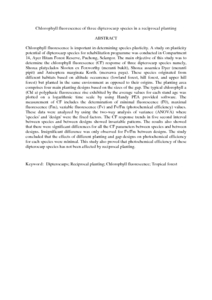Citation
Abdul Hamid, Hazandy and S., Sharifah Amira and Yusoff, Mohd Hazimy and Ismail, Mohd Kamil
(2009)
Chlorophyll fluorescence of three dipterocarp species in a reciprocal planting.
The Malaysian Forester, 72 (2).
pp. 165-173.
ISSN 0302-2935
Abstract
Chlorophyll fluorescence is important in determining species plasticity. A study on plasticity potential of dipterocarp species for rehabilitation programme was conducted in Compartment 14, Ayer Hitam Forest Reserve, Puchong, Selangor. The main objective of this study was to determine the chlorophyll fluorescence (CF) response of three dipterocarp species namely, Shorea platyclados Slooten ex Foxworthy (meranti bukit), Shorea assamica Dyer (meranti pipit) and Anisoptera marginata Korth. (mersawa paya). These species originated from different habitats based on altitude occurrence (lowland forest, hill forest, and upper hill forest) but planted in the same environment as opposed to their origins. The planting area comprises four main planting designs based on the sizes of the gap. The typical chlorophyll a (Chl a) polyphasic fluorescence rise exhibited by the average values for each stand age was plotted on a logarithmic time scale by using Handy PEA provided software. The measurement of CF includes the determination of minimal fluorescence (F0), maximal fluorescence (Fm), variable fluorescence (Fv) and Fv/Fm (photochemical efficiency) values. These data were analyzed by using the two-way analysis of variance (ANOVA) where 'species' and 'design' were the fixed factors. The CF response trends in five second interval between species and between designs showed invariable patterns. The results also showed that there were significant differences for all the CF parameters between species and between designs. Insignificant difference was only observed for Fv/Fm between designs. The study concluded that the effects of different planting and gap designs on photochemical efficiency for each species were minimal. This study also proved that photochemical efficiency of these dipterocarp species has not been affected by reciprocal planting.
Download File
![[img]](http://psasir.upm.edu.my/13590/1.hassmallThumbnailVersion/Chlorophyll%20fluorescence%20of%20three%20dipterocarp%20species%20in%20a%20reciprocal%20planting.pdf)  Preview |
|
PDF (Abstract)
Chlorophyll fluorescence of three dipterocarp species in a reciprocal planting.pdf
Download (85kB)
| Preview
|
|
Additional Metadata
Actions (login required)
 |
View Item |

